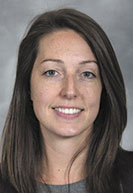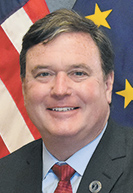Subscriber Benefit
As a subscriber you can listen to articles at work, in the car, or while you work out. Subscribe NowAttorneys for Indianapolis OB-GYN Dr. Caitlin Bernard and from the Indiana Attorney General’s Office faced off Friday morning during an emergency hearing after the abortion provider filed suit seeking to stop the attorney general from attempting to access her patient’s medical records.
The hearing came on the heels of a lawsuit filed by Bernard on Nov. 3, which requests the Marion Superior Court declare Rokita and Scott Barnhart, chief counsel and director of the attorney general’s Consumer Protection Division, violated state statute, exceeded their authority and breached confidentiality provisions regarding consumer complaints.
Bernard’s name was spotlighted on national news after she publicly stated in July that she had performed an abortion on a 10-year-old rape victim from Ohio. Since, Rokita’s office has maintained its investigating Bernard.
The doctor subsequently filed a lawsuit seeking to block the attorney general’s “baseless investigation” into physicians who provide abortion care, and claims that without court action the attorney general could conduct similar investigations.
Marion Superior Court Judge Heather Welch granted an emergency motion stemming from the suit filed last week by attorneys Kathleen DeLaney of DeLaney & DeLaney LLC and pro bono counsel Arnold & Porter, who are representing Bernard and her medical partner, Dr. Amy Caldwell.
“We need the court to intervene and halt these bogus allegations and order (the attorney general) to stop violating confidentiality orders he is sworn to uphold,” DeLaney asserted to the court during opening statements Friday.

Attorneys for Bernard initially asked the commercial court in Marion County to grant relief in a motion for preliminary injunction regarding the “improper investigations” initiated by Rokita’s office, including subpoenas served for patient records.
However, attorneys for Rokita and Barnhart filed a notice of refusal to consent to the commercial court docket, instead moving for a change of judge. Welch held a status conference Monday before granting the motion.
The Marion Superior Court judge subsequently denied a motion to continue filed by the attorney general’s office during the emergency hearing, expressing growing exasperation with both parties in the case for failing to ask discovery questions ahead of time.
Welch quickly pointed out that neither the affiliates nor the defendants were present for the emergency hearing.
“I heard nothing from anybody about setting up schedules of expedited discovery and requiring or issuing an order as to who will be testifying,” Welch said pointedly. “So I’m a little baffled by the fact that nobody reached out.”
Up first, DeLaney asserted that if left unchecked, the attorney general’s actions could lead to patient identities being publically disclosed, subjecting them to harassment based on their most sensitive medical information.
She also asserted that continued investigations against the doctors could create an environment where future patients will be unable to access legal and safe medical care without fear that strangers would read their medical records.
The doctor’s attorneys alleged several of the complaint forms received by Rokita’s office also include “falsehoods or misrepresentations.”
Three medical doctors testified as experts, beginning with Dr. Kyle Brothers, a bioethicist and associate professor in the department of pediatrics at the University of Louisville.

Brothers said that if patients have concerns that their medical information will be disclosed to the government, that would affect the quality of care that a physician can provide to that patient.
He cited two examples – the HIV pandemic and immigration controversies in the public realm – in which he opined “very strong evidence” exists that patients were hesitant to see providers and expressed an unwillingness to disclose information.
Brothers testified that if a patient knew that the attorney general could see their personal information, including their name, address, and medical charts, among other things, then that would have a negative impact on the patient-doctor relationship.
“I think this is quite similar to some of the things patients sometimes talk to me about that they’re afraid of,” he said. “Especially for a minor it’s just heartbreaking, if there’s something really horrible. This is very sensitive information.”
Dr. Elicia Harris, a high-risk OB-GYN hospitalist at Community North Hospital, opined during testimony that if a patient has not filed a complaint or expressed concern about the outcome of their medical care, it would be unfounded to inquire about a patient’s personal medical record and history.
“I think that that’s a deterrent for patient care,” Harris testified. “And I feel like that oversteps HIPAA and just an overall level of confidentiality that is an expectation when providing patient care.”
Dr. Tom Ledyard, medical director for hospice and palliative medicine at Community Health Network, spoke to the standard practice used among physicians to discuss individual patient cases in a de-identified way.
If prohibited from being able to communicate about patient care in a de-identified way, Ledyard said it would stop medical innovation in its tracks and impact direct care among a variety of medical peers.
The attorney general’s office did not bring persons in to testify during the Friday emergency hearing. Deputy Attorney General Caryn Nieman Szyper, leading the attorney general’s team, stated that it was “completely unfair to the defense” that both Bernard and Caldwell “refused to appear” on the basis of being unavailable.
“We recognize the significant interest in this matter,” a representative of the attorney general’s office said after the hearing. “The Office of the Attorney General will speak through its court filings. And in light of that, we have a lot to do and I’d ask that you let us excuse ourselves so we can get back to the work of the office.”
The parties were directed to return to court on Monday at 1 p.m. ET to hear potential testimony from Bernard and a representative of the Consumer Protection Division to be selected by Rokita’s attorneys.
Welch said she expects to issue an order Saturday concerning who she wants to testify on Monday.
During the hearing, attorneys for Rokita stated that the investigation into Caldwell has concluded and therefore they would forgo requesting to hear from her in testimony.
DeLaney confirmed Friday that a letter was sent to her client stating that the investigation against Caldwell is closed.
“That does not mean that she is no longer a proper party in the case,” DeLaney said. “She has not been removed from the case and we don’t expect that she will be.”
Please enable JavaScript to view this content.

